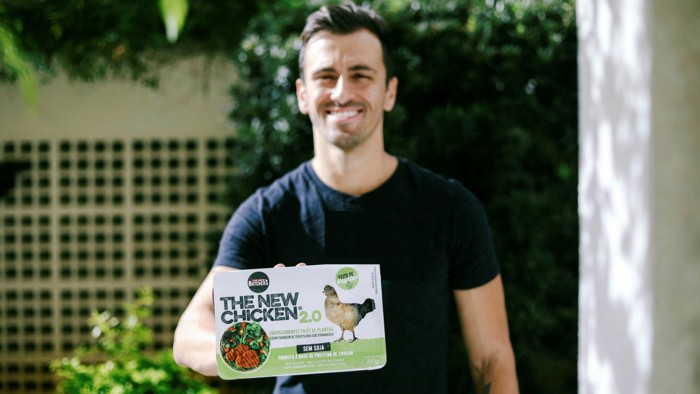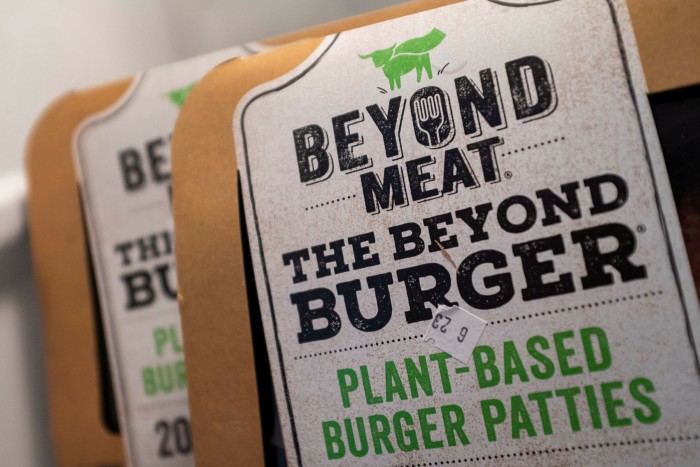Plant-based meat hopefuls square up to Brazil’s beef giants

Roula Khalaf, Editor of the FT, selects her favourite stories in this weekly newsletter.
As a vegan in a country famous for its love of meat, Bruno Fonseca often heard family and friends say they, too, would like to change their diet — if only the alternatives were more appetising.
So, motivated by concerns about the environmental impact of livestock farming, the mechanical engineer set about making food products that imitate animal flesh but are made entirely from plant matter.
“It became clear to me: if we replicate the taste, it is much easier for someone to change the source of the protein rather than the habit,” explains the co-founder of The New Butchers.
Since launching less than two years ago, the plant-based “beefburgers” and “chicken” sold by the Brazilian brand are now available in 300 supermarkets across the country. And, with demand booming, it is building a new factory to expand output eightfold.
Despite Brazil’s carnivorous reputation and status as the world’s biggest exporter of beef, a steady flow of plant-based meat substitutes is entering the commercial mainstream.
It is a response to changing dietary habits. The number of Brazilians identifying as fully or partially vegetarian jumped by three-quarters to 14 per cent of the 210m population over a six-year period, according to a survey by the pollsters Ibope in 2018.
VC backing
Following in the footsteps of pioneers such as Beyond Meat and Impossible Foods, homegrown “food-techs” are tapping into this appetite. Some have attracted venture capital: The New Butchers counts among its backers Lever VC, whose founders were early investors in both those US trailblazers.
The trend has particular resonance in Brazil, where rising deforestation linked to the meat industry risks turning the country into an international pariah — given the Amazon’s important role in maintaining the global climate.
“Our big project [is] to somehow give a new face to Brazil, where it can also be a storehouse of plant-based production for the whole world and not only meat production of animal origin,” says Marcos Leta, founder of Fazenda Futuro, or “Future Farm”.
The start-up offers vegan-friendly burgers, minced beef, meatballs, sausages and chicken. In just two years of existence, it has drawn in outside funding that it says values the business at $150m. Its products contain soy, peas and chickpeas, with beetroot for colouring and coconut fat for juiciness.
The New Butchers’ key component is pea protein, which is mixed with other ingredients and put through an extrusion process that Fonseca likens to how macaroni pasta is made.
As well as avoiding animal slaughter, the products provide a feelgood factor for the climate-conscious consumer. The New Butchers claims that its offerings reduce carbon emissions by 92 per cent compared with animal-derived equivalents (although, for now, the pea protein powder is imported).

A common ambition among Brazil’s fake meat producers is to go beyond vegans and vegetarians and target omnivores, or so-called “flexitarians”.
And the country’s weakened exchange rate has handed them an advantage. Combined with trade tariffs on imports, it makes established foreign competitor brands relatively expensive in Brazil.
Price barrier
At present, however, even domestic animal product substitutes are often dearer than the real thing, meaning the category is the preserve of wealthier socio-economic classes in a country where poverty and hunger rose during the Covid-19 pandemic.
“One of the difficulties for advancing this segment is affordability,” admits Sergio Molinari at São Paulo-based Food Consulting. But he adds that it is becoming “economically more viable every day”.
The depreciation of the Brazilian real has also opened up commercial routes for exports, with a potentially huge prize. Globally, sales of novel vegan replacements could be worth $120bn by 2025, or 10 per cent of the global meat market, according to estimates by the consultancy Kearney.
Fazenda Futuro is aiming to derive half of its revenues from overseas markets this year, although it declines to disclose details of its turnover.
“I don’t see Beyond Meat as a competitor,” says Leto. “My competitor at the end of the day is the meatpackers and my job is to make them obsolete. The more plant-based [products] in the world, the better for me.”
Yet, just like Big Oil and Big Tobacco before it, Big Meat is not standing still in the face of disruptive upstarts aiming to capitalise on changing societal attitudes.
The world’s largest meat processor, Brazil’s JBS, now offers a range of products free of animal content through its Seara arm. This includes ready-meals that ape traditional dishes such as escondidinho, a sort of chicken shepherd’s pie.
Seara’s Linha Incrível (“Incredible Line”) uses what it calls “Biomolecule i”, a patented ingredient created in the company’s laboratories that is intended to give a flavour and texture like meat.
“Brazilians are meat experts so they will have a very high bar on what they get from plant-based,” explains João Campos, executive director of prepared foods at the subsidiary.
JBS, which has around $50bn in annual revenue, says it is already responsible for more than half of all domestic sales of burgers of vegetable origin.
Campos points to estimates that 70 per cent more protein will be needed in the next 30 years. “And we believe plant-based will be a source.”
Climate Capital

Where climate change meets business, markets and politics. Explore the FT’s coverage here

Comments